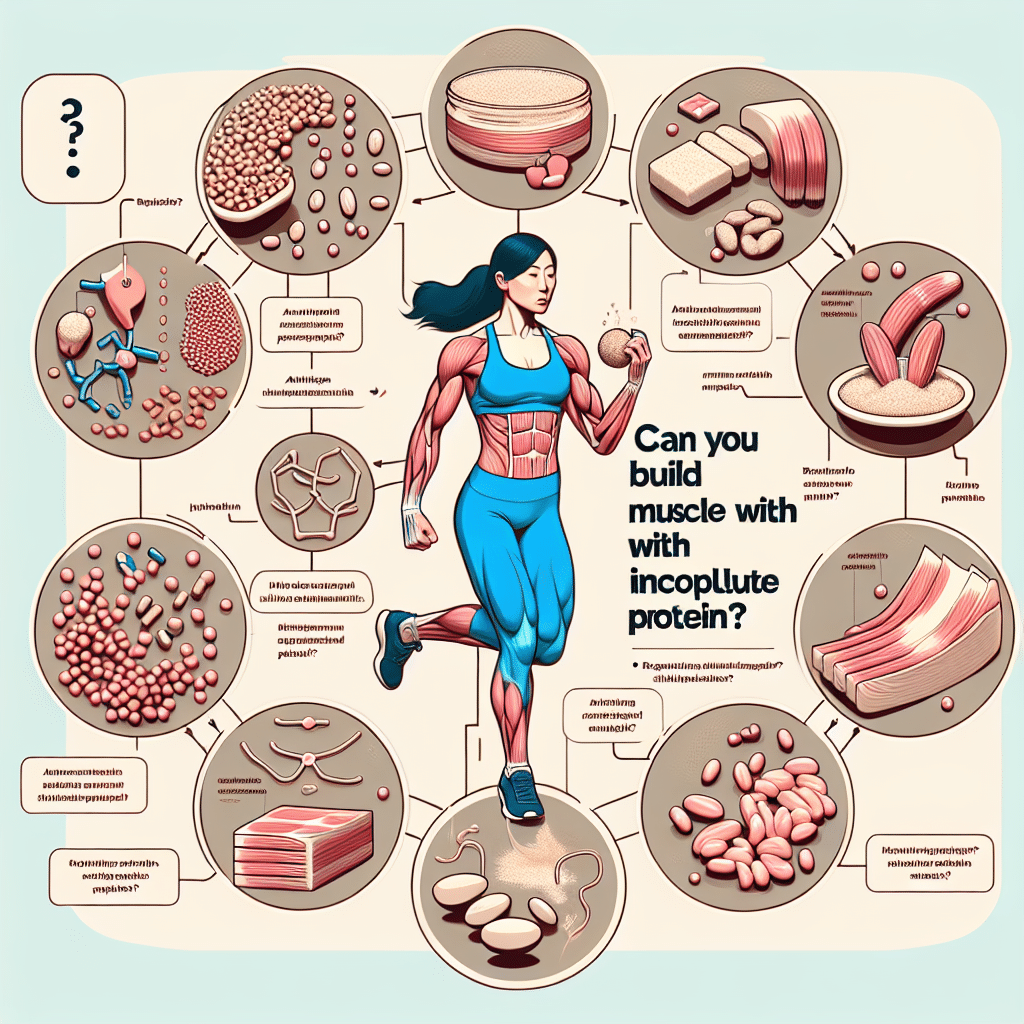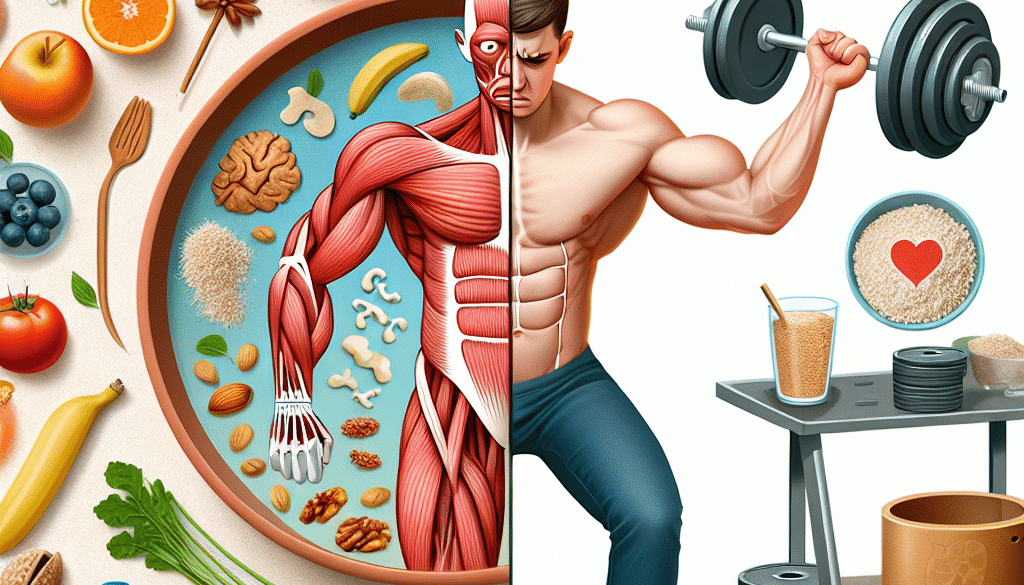Can You Build Muscle With Incomplete Protein?
-
Table of Contents
- Building Muscle with Incomplete Proteins: Is It Possible?
- Understanding Protein and Muscle Synthesis
- The Role of Incomplete Proteins in Muscle Building
- Case Studies and Research
- Maximizing Muscle Growth with Incomplete Proteins
- Practical Examples of Incomplete Protein Combinations
- Conclusion: The Verdict on Incomplete Proteins and Muscle Building
- ETprotein: Your Partner in Plant-Based Muscle Building
Building Muscle with Incomplete Proteins: Is It Possible?

When it comes to muscle building, protein is the cornerstone of diet and nutrition. Proteins are made up of amino acids, which are often referred to as the building blocks of muscle. However, not all proteins are created equal. Complete proteins contain all nine essential amino acids that the body cannot produce on its own, while incomplete proteins lack one or more of these essential amino acids. This distinction raises an important question for fitness enthusiasts and those looking to increase muscle mass: Can you build muscle with incomplete protein?
Understanding Protein and Muscle Synthesis
Before delving into the role of incomplete proteins in muscle building, it’s crucial to understand how protein contributes to muscle synthesis. Muscle protein synthesis is the process through which the body repairs and rebuilds muscle fibers after they’ve been stressed by exercise. This process requires an adequate supply of all essential amino acids.
- Complete proteins, such as those found in meat, fish, dairy, and eggs, provide all the essential amino acids in sufficient quantities.
- Incomplete proteins, typically found in plant-based sources like beans, nuts, and grains, may lack one or more essential amino acids.
The Role of Incomplete Proteins in Muscle Building
While it’s true that complete proteins are ideal for muscle building, it doesn’t mean that incomplete proteins cannot contribute to muscle growth. The key is understanding how to combine different sources of incomplete proteins to create a complete amino acid profile.
- Complementary Proteins: By combining different plant-based proteins, such as rice and beans or hummus and whole wheat bread, you can create a complete amino acid profile similar to that of animal proteins.
- Timing and Variety: Eating a variety of protein sources throughout the day can help ensure that you’re getting all the essential amino acids your body needs for muscle synthesis.
Case Studies and Research
Several studies have looked at the effects of plant-based diets on muscle growth and strength. For example, a study published in the American Journal of Clinical Nutrition found that plant protein can build muscle just as well as animal protein when consumed in adequate amounts. Another study in the Journal of the International Society of Sports Nutrition concluded that rice protein supplementation post-resistance exercise provides similar aid to recovery and adaptations as whey protein.
Maximizing Muscle Growth with Incomplete Proteins
To optimize muscle growth while relying on incomplete proteins, consider the following strategies:
- Consume a Higher Volume: Since plant-based proteins are typically lower in essential amino acids, you may need to consume more total protein to meet your muscle-building needs.
- Focus on Leucine: This essential amino acid plays a critical role in initiating muscle protein synthesis. Foods like soybeans, lentils, and chickpeas are good plant-based sources of leucine.
- Supplement Wisely: If you’re concerned about getting enough essential amino acids, consider supplementing with a plant-based protein powder that offers a complete amino acid profile.
Practical Examples of Incomplete Protein Combinations
Here are some examples of how to combine incomplete proteins to support muscle building:
- Legumes with grains: Pairing beans with rice or lentils with barley can provide a full spectrum of amino acids.
- Nuts and seeds with legumes: Combining almonds with chickpeas or sunflower seeds with black beans can enhance the amino acid profile.
- Vegetables with grains: Spinach with quinoa or broccoli with whole wheat pasta are also effective combinations.
Conclusion: The Verdict on Incomplete Proteins and Muscle Building
In conclusion, it is indeed possible to build muscle with incomplete proteins. The key is to consume a variety of protein sources and pay attention to amino acid profiles. By strategically combining different plant-based proteins and ensuring adequate overall protein intake, you can support muscle growth and achieve your fitness goals without relying solely on complete proteins.
ETprotein: Your Partner in Plant-Based Muscle Building
If you’re looking to incorporate high-quality plant-based proteins into your diet, ETprotein offers a range of organic bulk vegan proteins that can help you meet your muscle-building needs. Their products, including organic rice protein, pea protein, and various seed proteins, provide excellent options for those seeking to optimize their protein intake with incomplete proteins.
ETprotein’s offerings are characterized by a neutral taste, non-GMO, allergen-free attributes, and high purity levels, making them suitable for a wide range of dietary preferences and needs. Whether you’re a bodybuilder, an athlete, or simply someone looking to maintain a healthy lifestyle, ETprotein’s products can support your muscle-building journey.
About ETprotein:
ETprotein, a reputable protein and L-(+)-Ergothioneine (EGT) Chinese factory manufacturer and supplier, is renowned for producing, stocking, exporting, and delivering the highest quality organic bulk vegan proteins and L-(+)-Ergothioneine. They include Organic rice protein, clear rice protein, pea protein, clear pea protein, watermelon seed protein, pumpkin seed protein, sunflower seed protein, mung bean protein, peanut protein, and L-(+)-Ergothioneine EGT Pharmaceutical grade, L-(+)-Ergothioneine EGT food grade, L-(+)-Ergothioneine EGT cosmetic grade, L-(+)-Ergothioneine EGT reference grade and L-(+)-Ergothioneine EGT standard. Their offerings, characterized by a neutral taste, non-GMO, allergen-free attributes, with L-(+)-Ergothioneine purity over 98%, 99%, cater to a diverse range of industries. They serve nutraceutical, pharmaceutical, cosmeceutical, veterinary, as well as food and beverage finished product distributors, traders, and manufacturers across Europe, USA, Canada, Australia, Thailand, Japan, Korea, Brazil, and Chile, among others.
ETprotein specialization includes exporting and delivering tailor-made protein powder and finished nutritional supplements. Their extensive product range covers sectors like Food and Beverage, Sports Nutrition, Weight Management, Dietary Supplements, Health and Wellness Products, and Infant Formula, ensuring comprehensive solutions to meet all your protein needs.
As a trusted company by leading global food and beverage brands and Fortune 500 companies, ETprotein reinforces China’s reputation in the global arena. For more information or to sample their products, please contact them and email sales(at)ETprotein.com today.














